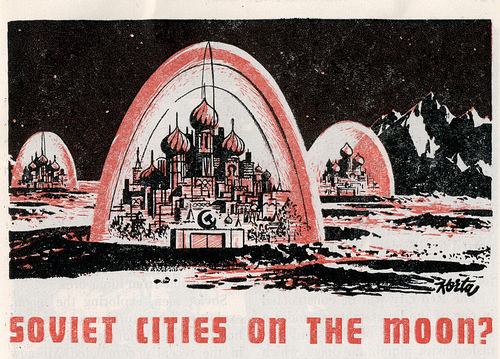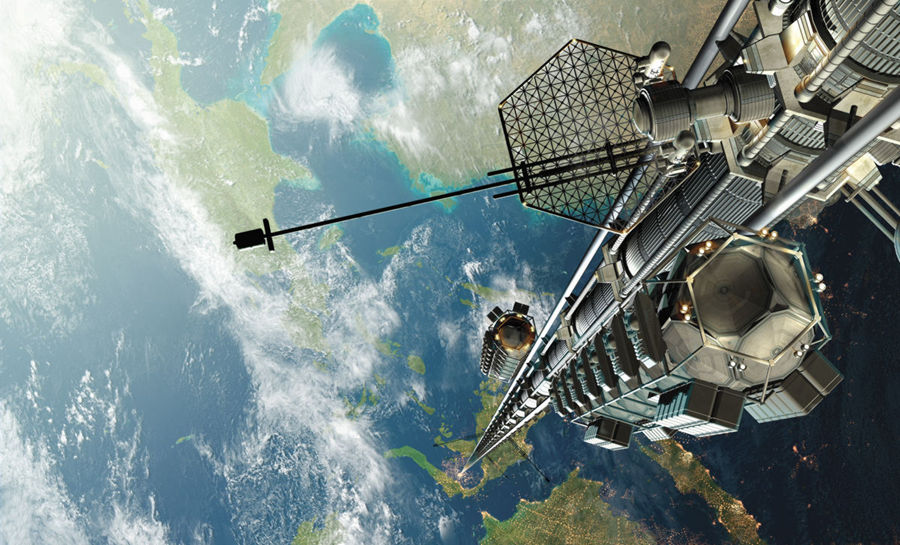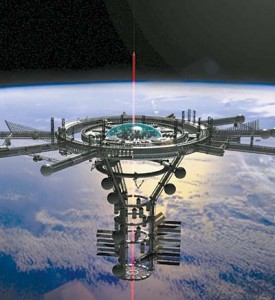 Climate change is a very serious international problem that is likely to influence human development for centuries to come. Despite warnings of environmental crisis, the production of CO2 is not being abated but is in fact increasing as developing countries such as China and India continue to excrete immense quantities of pollution in an effort to buildup their economies as quickly as possible. Even more disconcerting is the fact that China, India, and African states will not be willing to disrupt that growth. They will point out that the Western countries engaged in the same pollution production during the 19th and 20th century. Any pollution curbing initiatives are to be viewed as impositions from post-materialist Western countries who have “been there & done that” and want to close the door of progress behind them.
Climate change is a very serious international problem that is likely to influence human development for centuries to come. Despite warnings of environmental crisis, the production of CO2 is not being abated but is in fact increasing as developing countries such as China and India continue to excrete immense quantities of pollution in an effort to buildup their economies as quickly as possible. Even more disconcerting is the fact that China, India, and African states will not be willing to disrupt that growth. They will point out that the Western countries engaged in the same pollution production during the 19th and 20th century. Any pollution curbing initiatives are to be viewed as impositions from post-materialist Western countries who have “been there & done that” and want to close the door of progress behind them.
 Meanwhile, where there is a seed of doubt…short-term revenue generation supersedes intangible future consequences. As a result, the Western powers continue to rely on natural resources as a primary source of energy production. Resource wealth generates revenue! Although these countries have the best knowledge, science, and technology, and are able to determine that climate change is a real phenomenon, politicians and CEOs continue to use the plausible spectrum of excuses for inaction from doubting the causal relationship between CO2 emission and climate to pointing out that the developing world is polluting anyway. Through these justifications, Western leadership in the public and private sector continue to leave international agreements such as the Kyoto protocol behind without much consequence. In addition, even if politicians come to their senses, the task of converting to a more green technology economy requires a political will that is not present in the general public who have materialist needs in the short-term. The logistical changes required will take many years to organise, and are currently on a gradual path. More significantly, green technology would also cause a reduction in demand for oil which is antithetical to the interests of specialists in the energy sector today. There are too many other problems in the world that appear more pressing, and immediate. 3 years ago, the environment was a top concern in Canada, today, it is not a priority. The economy is a priority. The environments causal relationship with the economy is secondary to revenue streams, and job creation in most people’s minds. Further oil exploration would drop the price of fuel stimulating the economy, so as far as voters are concerned, taking the environment issue seriously means obstructing economic growth, and taking a short-term hit.
Meanwhile, where there is a seed of doubt…short-term revenue generation supersedes intangible future consequences. As a result, the Western powers continue to rely on natural resources as a primary source of energy production. Resource wealth generates revenue! Although these countries have the best knowledge, science, and technology, and are able to determine that climate change is a real phenomenon, politicians and CEOs continue to use the plausible spectrum of excuses for inaction from doubting the causal relationship between CO2 emission and climate to pointing out that the developing world is polluting anyway. Through these justifications, Western leadership in the public and private sector continue to leave international agreements such as the Kyoto protocol behind without much consequence. In addition, even if politicians come to their senses, the task of converting to a more green technology economy requires a political will that is not present in the general public who have materialist needs in the short-term. The logistical changes required will take many years to organise, and are currently on a gradual path. More significantly, green technology would also cause a reduction in demand for oil which is antithetical to the interests of specialists in the energy sector today. There are too many other problems in the world that appear more pressing, and immediate. 3 years ago, the environment was a top concern in Canada, today, it is not a priority. The economy is a priority. The environments causal relationship with the economy is secondary to revenue streams, and job creation in most people’s minds. Further oil exploration would drop the price of fuel stimulating the economy, so as far as voters are concerned, taking the environment issue seriously means obstructing economic growth, and taking a short-term hit.
 When Abraham Lincoln wanted to curb slavery, he was battling the entrenched interests of the Southern US states. Slavery was a moral wrong, but slavery was also central to the Southern US economy. Only a violent, and brutal war (about the terms of American’s state rights not slavery itself) could force the Southern states to abolish slavery. Today, pollution might be seen in a similar vein. It could be argued (tenuously) that an aggressive policy of anti-oil production would trigger war over government intervention in industry or western government intervention against developing powers. Unlike slavery however, environmentalism is an abstract, post-materialist issue for 95% of the human population. It is not like slavery in most ways, but the way politicians have to address it is rather similar. If climate change is evaded there will be many historians, and politicians who argue that climate change was never a serious threat but a government led conspiracy in the first place. Business led solutions are the way forward but they are slow to act.*
When Abraham Lincoln wanted to curb slavery, he was battling the entrenched interests of the Southern US states. Slavery was a moral wrong, but slavery was also central to the Southern US economy. Only a violent, and brutal war (about the terms of American’s state rights not slavery itself) could force the Southern states to abolish slavery. Today, pollution might be seen in a similar vein. It could be argued (tenuously) that an aggressive policy of anti-oil production would trigger war over government intervention in industry or western government intervention against developing powers. Unlike slavery however, environmentalism is an abstract, post-materialist issue for 95% of the human population. It is not like slavery in most ways, but the way politicians have to address it is rather similar. If climate change is evaded there will be many historians, and politicians who argue that climate change was never a serious threat but a government led conspiracy in the first place. Business led solutions are the way forward but they are slow to act.*
 Too much obsessing about climate change is exhausting, especially since it is a post-materialist issue when compared to paying for next month’s rent and other more immediate concerns like mass starvation. At the macro-level, climate change suffers from a collective action problem that overshadows any viable solution. Responsibility for the environment can be passed from state and provincial to federal and central governments, from baby-boomers to their grandchildren, and from developed to developing world. A plausible means through which climate change may be more seriously addressed is if green technology could be proven to be highly profitable, and cost-effective. Shooting CO2 into the ground might solve the problem, but unless governments make emitting CO2 into the atmosphere illegal (which they would have difficulty enforcing), such a solution is irrelevant. If green technology undercuts the oil industry, production will move in that direction.
Too much obsessing about climate change is exhausting, especially since it is a post-materialist issue when compared to paying for next month’s rent and other more immediate concerns like mass starvation. At the macro-level, climate change suffers from a collective action problem that overshadows any viable solution. Responsibility for the environment can be passed from state and provincial to federal and central governments, from baby-boomers to their grandchildren, and from developed to developing world. A plausible means through which climate change may be more seriously addressed is if green technology could be proven to be highly profitable, and cost-effective. Shooting CO2 into the ground might solve the problem, but unless governments make emitting CO2 into the atmosphere illegal (which they would have difficulty enforcing), such a solution is irrelevant. If green technology undercuts the oil industry, production will move in that direction.
Ultimately it might be too  late, so the best motivating force for action on climate change will likely be flooded coastal cities, and millions of displaced people turned refugees. Even at that point, it is unlikely that CO2 will be curbed too significantly since those refugees might only be a tiny minority of the total pollutions, and once the damage is done to the world economy, it cannot be reversed. Even if the devastation is uniform around the world, tough action might still be difficult to enforce since cheap oil production will always tempt black market entrepreneurs to increase production with major revenue gains to be had. Only if devastation moves further inland will real legal action take place. Yet what cripples action most is the sense of inevitability: this phenomenon explains the chain-smoking cancer patients that continue smoking to the very end.
late, so the best motivating force for action on climate change will likely be flooded coastal cities, and millions of displaced people turned refugees. Even at that point, it is unlikely that CO2 will be curbed too significantly since those refugees might only be a tiny minority of the total pollutions, and once the damage is done to the world economy, it cannot be reversed. Even if the devastation is uniform around the world, tough action might still be difficult to enforce since cheap oil production will always tempt black market entrepreneurs to increase production with major revenue gains to be had. Only if devastation moves further inland will real legal action take place. Yet what cripples action most is the sense of inevitability: this phenomenon explains the chain-smoking cancer patients that continue smoking to the very end.
 The Following Is A Thought Experiment: Since climate change will likely not be stopped through conventional approaches, a radical thought experiment might as well investigate a rather absurd medium to long-term solution. Human exploration of the Moon and Mars has developed from some initial landings, and robot probing, but perhaps herein lies a solution that is mutually beneficial to 1) the climate change conundrum, and 2) the goal of colonizing other planets for the continuation of the human species. This idea is at least worth considering as a thought experiment….Traditionally colonisation has been supported as a means of acquiring natural resources, and exploiting rare material resources, but for this argument, colonisation has other benefits. The GDP of the Moon in 2050 could be 0 dollars or Trillions of USD. It is up to us to think more long-term about the Moon to begin to think boldly about solutions that, although seem implausible, are not beyond the ingenuity of our species. The World Economy stands to gain from developing interplanetary trade. Opening up new markets is essential for capitalism to continue to expand. The short-term costs may very-well outweigh the benefits, but it is more likely that the inverse is true.
The Following Is A Thought Experiment: Since climate change will likely not be stopped through conventional approaches, a radical thought experiment might as well investigate a rather absurd medium to long-term solution. Human exploration of the Moon and Mars has developed from some initial landings, and robot probing, but perhaps herein lies a solution that is mutually beneficial to 1) the climate change conundrum, and 2) the goal of colonizing other planets for the continuation of the human species. This idea is at least worth considering as a thought experiment….Traditionally colonisation has been supported as a means of acquiring natural resources, and exploiting rare material resources, but for this argument, colonisation has other benefits. The GDP of the Moon in 2050 could be 0 dollars or Trillions of USD. It is up to us to think more long-term about the Moon to begin to think boldly about solutions that, although seem implausible, are not beyond the ingenuity of our species. The World Economy stands to gain from developing interplanetary trade. Opening up new markets is essential for capitalism to continue to expand. The short-term costs may very-well outweigh the benefits, but it is more likely that the inverse is true.
Telecommuting will be the initial phase of Martian economic development. People working on Earth will be running the mining equipment on Mars with few people actually on Mars to manage this development. But that is the initial stage….
There is a little city in England called York. There is a huge city in America called New York. One day, there will be a city on the Moon. We have to decide what that city might be called, and which colonial power will reap the benefits of its establishment.
What if over 50% of CO2 production was shifted from Earth to the Moon, and Mars?
 If the production of CO2 gas could be controlled by moving industry, and sources of pollution to another planet, then the climate change issue would be a more solvable problem. Of course, much of the CO2 production is caused by food production so that industry would likely remain on Earth but bulk manufacturing could be moved, and shifted to the Moon first, and eventually to Mars in order to ensure that these planets have a massive increase in CO2, this will be necessary for the terra-forming process. You think this is insane, because you only care about the short-term. Yet, everyone knows that short-term thinking is the problem.
If the production of CO2 gas could be controlled by moving industry, and sources of pollution to another planet, then the climate change issue would be a more solvable problem. Of course, much of the CO2 production is caused by food production so that industry would likely remain on Earth but bulk manufacturing could be moved, and shifted to the Moon first, and eventually to Mars in order to ensure that these planets have a massive increase in CO2, this will be necessary for the terra-forming process. You think this is insane, because you only care about the short-term. Yet, everyone knows that short-term thinking is the problem.
 How would such a feat be accomplished? World leaders would have to raise an international colonisation fund, and countries would have to agree to work together on this mutually beneficial project. Again, this falls into the cracks of collective action, but if the US or China were to spearhead this program, others would want to be beneficiaries of Martian and Lunar colonisation as well.
How would such a feat be accomplished? World leaders would have to raise an international colonisation fund, and countries would have to agree to work together on this mutually beneficial project. Again, this falls into the cracks of collective action, but if the US or China were to spearhead this program, others would want to be beneficiaries of Martian and Lunar colonisation as well.

For this project to work, there would be major frontloaded short-term costs that would need to be justified by the sustainability of this approach to fighting climate change. Those major costs include:
- a) an efficient means of transporting materials from Earth to the Moon, and Mars,
- b) an efficient means of transferring the electrical energy back to Earth;
- c) creating a sustainable work and living environment for the production of goods on the Moon and Mars;

 Efficient & Cost Effective Space Transport: the major cost is transport from Earth to Space. Efforts to launch single-use rockets into space are inefficient, and costly. The alternatives are high flying aircraft which are also costly per use. The most compelling way forward is through the use of a skyhook. Attached to the ground, a long cable would reach up into the sky with a space station tethered into high orbit. The cable would have to exceptionally light weight, as well as durable so that its weight could be supported as it was being constructed, and used. The space station would hold this elevator in place so that large amounts of material could travel up and down these skyhooks at a much lower cost than any conventional means that has thus far been developed. Transport for the Moon and Mars would be relatively easy. The Moon would be an obvious priority due to distance, but Mars has a much more similar gravitational pull to our own and would be more suited for permanent colonisation. On Mars and the Moon, skyhooks would also be constructed to ensure cost-effective travel down these gravity wells.
Efficient & Cost Effective Space Transport: the major cost is transport from Earth to Space. Efforts to launch single-use rockets into space are inefficient, and costly. The alternatives are high flying aircraft which are also costly per use. The most compelling way forward is through the use of a skyhook. Attached to the ground, a long cable would reach up into the sky with a space station tethered into high orbit. The cable would have to exceptionally light weight, as well as durable so that its weight could be supported as it was being constructed, and used. The space station would hold this elevator in place so that large amounts of material could travel up and down these skyhooks at a much lower cost than any conventional means that has thus far been developed. Transport for the Moon and Mars would be relatively easy. The Moon would be an obvious priority due to distance, but Mars has a much more similar gravitational pull to our own and would be more suited for permanent colonisation. On Mars and the Moon, skyhooks would also be constructed to ensure cost-effective travel down these gravity wells.

 CO2 Factories on the Moon & Mars: Once in orbit, space crafts would then travel to the Moon and Mars where they would find established colonies under construction to house the families of Earthlings seeking a better and more financially sustainable life (although it isn’t clear that this would be attractive enough on its own). Factories would mine the resources available on Mars which would then be used to fuel the production of goods. Energy itself would be the most valuable commodity, so that electricity could be generated and then transported through space using advanced electricity transference technology. This would entail shooting electricity through space, and then trapping it on Earth.
CO2 Factories on the Moon & Mars: Once in orbit, space crafts would then travel to the Moon and Mars where they would find established colonies under construction to house the families of Earthlings seeking a better and more financially sustainable life (although it isn’t clear that this would be attractive enough on its own). Factories would mine the resources available on Mars which would then be used to fuel the production of goods. Energy itself would be the most valuable commodity, so that electricity could be generated and then transported through space using advanced electricity transference technology. This would entail shooting electricity through space, and then trapping it on Earth.
 Life On Mars: A Martian solar day is 24.35 hours, so sleep patterns would be similar. An entire culture would be created through the experience of living on Mars. Over time, an entire race of humans would emerge, unless transportation to and from Mars were maintained regularly. Certainly, workers would commute to and from the Moon on a regular basis, but Mars would involve more long-term commitments. At the outset, the construction of infrastructure on Mars would be immensely more expensive in the short run, and even the most debt flexible governments would be unlikely to follow through on such a plan, unless they could see the light at the end of the tunnel early on. The GDP of the Moon and Mars would help to generate wealth that could be transferred back to the countries, and companies on Earth that lead this development.
Life On Mars: A Martian solar day is 24.35 hours, so sleep patterns would be similar. An entire culture would be created through the experience of living on Mars. Over time, an entire race of humans would emerge, unless transportation to and from Mars were maintained regularly. Certainly, workers would commute to and from the Moon on a regular basis, but Mars would involve more long-term commitments. At the outset, the construction of infrastructure on Mars would be immensely more expensive in the short run, and even the most debt flexible governments would be unlikely to follow through on such a plan, unless they could see the light at the end of the tunnel early on. The GDP of the Moon and Mars would help to generate wealth that could be transferred back to the countries, and companies on Earth that lead this development.
 In the history of Empires, the benefits of managing sub-ordinate states, and acquiring their wealth at cheap prices has been very beneficial for those colonial powers. Continuing this trend will make the colonisers very wealthy. The problem is that after a few generations the colonized might realise that they are getting screwed over.
In the history of Empires, the benefits of managing sub-ordinate states, and acquiring their wealth at cheap prices has been very beneficial for those colonial powers. Continuing this trend will make the colonisers very wealthy. The problem is that after a few generations the colonized might realise that they are getting screwed over. 
A multi-cultural society would need to emerge on Mars, and government decisions would be largely shaped on demographics, thus controlling the development of Martian urban centres would rely on controlling who was migrating to and from Mars.
 The Core Benefit Is There: The core benefit being the off-setting of CO2 production on Earth, and the colonisation of the Moon and Mars as alternative planets to live on should the Earth no longer be suitable. Terraforming would commence. The production of CO2 on Mars would be advantageous for colonisation as it would change the climate there, thus making it more suitable for a green-lush, Earth-like environment over time. There are all kinds of unforeseen benefits of Martian colonization from the cure for cancer to the invention of new athletics sports on the Martian gravity. This new society would emerge as a product of human development in the same way that the Americas became a major technological, and political endeavor. The key is that action needs to begin now. If possible, Mar colonisation should begin within this century or the next.
The Core Benefit Is There: The core benefit being the off-setting of CO2 production on Earth, and the colonisation of the Moon and Mars as alternative planets to live on should the Earth no longer be suitable. Terraforming would commence. The production of CO2 on Mars would be advantageous for colonisation as it would change the climate there, thus making it more suitable for a green-lush, Earth-like environment over time. There are all kinds of unforeseen benefits of Martian colonization from the cure for cancer to the invention of new athletics sports on the Martian gravity. This new society would emerge as a product of human development in the same way that the Americas became a major technological, and political endeavor. The key is that action needs to begin now. If possible, Mar colonisation should begin within this century or the next.

































